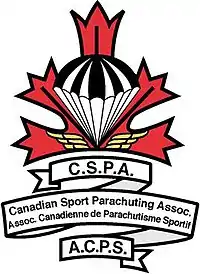Canadian Sport Parachuting Association
The Canadian Sport Parachuting Association (CSPA), through affiliation with the Aero Club of Canada (ACC), is Canada's representative to the Fédération Aéronautique Internationale (FAI) and the International Parachuting Commission (IPC). Thus, the CSPA is the official sport organization for sport parachuting in Canada.
 | |
| Sport | Skydiving |
|---|---|
| Jurisdiction | Canada |
| Founded | 1956 |
| Affiliation | International Parachuting Commission |
| Affiliation date | 1956 |
| Headquarters | 204 - 1468 Laurier Street |
| Location | Rockland, Ontario |
| President | Izzy Perry |
| Vice president(s) | Kaneena Vanstone |
| Official website | |
| www | |
Objectives
The primary objective of the CSPA is to promote safe and enjoyable sport parachuting through cooperation, adherence to self-imposed rules, and recommendations.
Skydivers and skydiving companies that wish to be members of the CSPA must adhere to the established Basic Safety Rules throughout their parachuting career. Such rules include minimum opening altitudes for certain levels of experience, mandatory equipment, clear weather conditions for jumping, reserve repack due dates, general operational requirements, etc. These Basic Safety Rules significantly reduce the risk of accidents for individual skydivers, skydiving companies, and the sport. A Canadian Drop Zone must adhere to all of these safety rules to be a member of the CSPA.
The CSPA has other initiatives to promote overall safety, such as recommended procedures and instructor qualification requirements. A Canadian skydiver starts with a solo license and then progresses to the A, B, C, and D licenses. The CSPA requires that each skydiver keep a log of every jump signed by another jumper and submit that logbook to acquire these qualifications. For example, to get a B License, you have to be able to perform certain manoeuvres and have 50 skydives documented in the submitted logbook. Without this basic proof, skydivers would have no idea how many jumps they have done and could embellish experience levels. This was a major risk earlier, but through proper documentation procedures, proof of a skydiver's experience is easily attainable, preventing inexperienced instructors from taking the lead.
The CSPA continually updates all programs and initiatives to adapt to increasing incidents and changes in technology. Every member (skydiver or skydiving company) must implement all changes to remain members.
CanPara
The CSPA publishes CanPara, a bimonthly bilingual publication devoted to informing the Canadian skydiving community of important activities and events in Canadian and worldwide skydiving. CanPara is produced by Annaleah McAvoy and Vic Lefrançois.[1]
Organization
The CSPA comprises Registered Participants and Member Groups. The Board of Directors will consist of no less than three and no more than seven Directors.[2]
National Office Staff:
- Executive Director: Michelle Matte-Stotyn
- Executive Secretary: Judy Renaud
There are several committees and officers that assist the BoD:
- Three Standing Committees:
- Technical & Safety Committee
- Coach Working Committee
- Competition & National Teams Committee.
- Ad-hoc committees (a sampling):
- CanPara - Bi-Monthly, bilingual Magazine
- Comp./Dev - Competition Development
- GRC - Government Regulatory Committee
- IT - Information Technology
- LTAD - Long Term Athlete Development
See also
References
- "CanPara". www.cspa.ca. 17 April 2015.
- "Governance". www.cspa.ca. 8 May 2015.
2006 Parachute Information Manual Part 1. CSPA